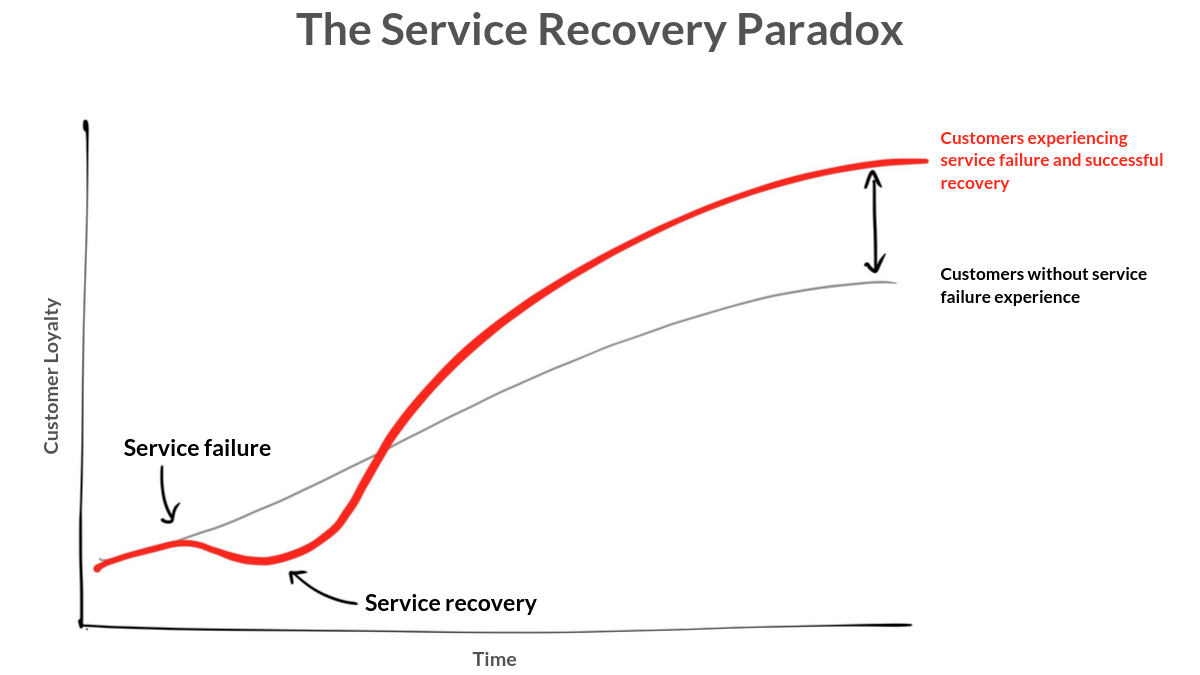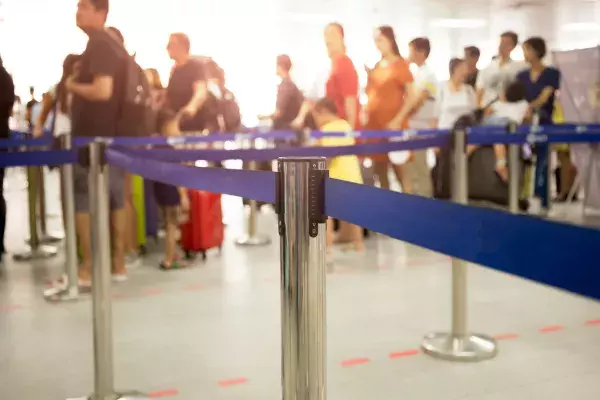30 September 2025 | Blog
IROPS: How effective service recovery can forge unbreakable loyalty
30 September 2025 | Blog
IROPS: How effective service recovery can forge unbreakable loyalty
After a successful keynote at our recent workshop in Dubai, we're delighted to have spoken with aviation industry expert Vimal Kumar Rai about his thoughts on why effective service recovery is essential to great customer experience and building loyalty.
“Disruptions are inevitable; dissatisfied passengers are not!” – Vimal Kumar Rai

Imagine a scenario where a flight disruption, a situation typically fraught with anger, distress and frustration, actually strengthens a customer's loyalty to your airline. This seemingly counter-intuitive idea is at the heart of the Service Recovery Paradox. This principle suggests that customers who experience a service failure, but subsequently receive an unexpectedly successful recovery effort, can actually emerge more satisfied and loyal than if no problem had occurred at all. It highlights the profound importance and potential of turning IROPS into genuine loyalty-building opportunities, demonstrating an airline’s commitment to its customers and transforming a negative experience into a memorably positive one.

For airline operations and leadership, this is not just an academic theory; it's a hidden opportunity. By understanding and leveraging the Service Recovery Paradox, you could gain profound loyalty amongst your customers, supercharge performance, and find new meaning in the vital work you do.
The disconnect: why airlines struggle with dissatisfaction
Despite significant technological advancements and improved communication tools, passenger satisfaction during disruptions remains a critical industry challenge. In fact, the demand versus satisfaction gap is the largest it has been in the last 5 years (i.e. since Covid), with sentiment actually trending downwards as flight numbers increase. This isn’t good prognosis given the projected increase in flight and passenger numbers over the next few years. A startling 36% of customer reviews on Tripadvisor in 2023 expressed dissatisfaction with IROPS handling, a significant jump from 20% in 2019. When combined with baggage issues and check-in/boarding (which can also be considered a form of “irregular” operations), these 3 categories account for a staggering 70% of all customer complaints.
Why this persistent struggle?
Based on my experience, research and work with numerous airlines there are 3 main reasons:
- Systems Thinking failure: Operational value chains are often disconnected, leading to a fragmented approach. Frontline ground staff and cabin crew frequently lack the necessary tools and information, highlighting a lack of "joined-up" thinking and actions.
- Insufficient preparation: Airlines and their local teams - who tend to be outsourced service providers - are often underprepared, with staff lacking adequate training, simulations, or even playbooks to effectively handle disruptions, particularly at a station (away from base) level.
- Customer blindness: This is arguably the most significant failure. Airlines often misunderstand or fail to address fundamental passenger needs, passing on this blindness to customer-facing staff. Even journey mapping initiatives often fail to translate into a deeper, empathetic understanding of customer needs and their “jobs-to-be-done” in any meaningful or personalised way.
Consequently, passengers are treated as a monolithic whole, un-segmented and very much misunderstood in terms of expectations and needs during a disruption. Aside from top-tier loyalty or Premium class passengers, everyone else faces a one-size-fits-all operation, which is the furthest possible thing from the “personalisation” that most airlines claim to deliver. It is no surprise then, that IROPS and disruptions give rise to the largest amount of customer dissatisfaction.
Solving this requires a conscious display of empathy along with more nuanced communication to passengers at the right time, with the right information.
The power of empathy: a lesson from Bangkok
I learnt about the critical importance of empathy and communication because of a bomb threat air turn-back of our flight from BKK to SEL in January 2000. At the time I was Station Manager for Singapore Airlines in Bangkok. Despite providing regular updates "by the book" in English every 30 minutes, a Korean passenger became violently agitated, suddenly attempting to physically assault me. It was a pivotal moment when I realised the passenger's anger stemmed not from malice, but from sheer frustration at not understanding a word of the English announcements.
"Silence is potentially the most expensive message we can ever send to passengers," I learned that night. Communication is your ONLY problem as far as your passengers are concerned. (Once a Korean-speaking crew member translated the updates, the distressed passenger became calm, even thankful. A similar situation occurred just weeks later and this time we were prepared in advance with updates in Korean, both printed and verbalised, resulting in some of the highest praise and compliments we ever received from an otherwise disruptive and distressing situation). Imagine that.
Memories > Metrics
This experience underscored that communication, empathy, and preparation were key. When disruptions strike, passengers aren't merely counting minutes; they are counting on you. What they truly remember isn't the duration, the snacks or the announcements, but how you made them feel during that time. Their emotional experience consistently outweighs the standard metrics and processes that airline teams focus on during disruption management and recovery.
Leveraging "Customer human truths" through behavioural science
To effectively implement service recovery and build loyalty, airlines must address core passenger needs. For example:
- Emotion > Information (Affect heuristic): People judge experiences based on feelings, not just facts. Instead of a technical update like "your flight is delayed 90 minutes," frame it with empathy: "we know this delay disrupts your day, here’s what we’re doing to get you moving". The emotional tone, and the recognition and labelling of the impact of the problem is crucial.
- Loss Aversion & reduction of uncertainty (Need for control): Uncertainty often feels worse than bad news. People crave clarity. Provide small, regular updates, even if there’s no new outcome, such as "still awaiting clearance; next update at 4:15 pm". This reduces perceived helplessness and induces hope.
- Choice & autonomy (Self-determination theory): Passengers cope better when they feel some control. Offer choices, like, "Would you prefer the 5:30 pm flight with a seat in economy, or the 7:00 pm with a guaranteed upgrade?". Empowering passengers reframes the situation and eases frustration.
- Framing & anchoring (Framing effect): How information is presented shapes perception. Instead of "your flight is delayed 2 hours," say "we’ll have you on your way by 5:30 pm, and in the meantime here’s a voucher for some food". Anchoring on the resolution makes delays feel less painful and shifts the focus to your efforts in resolution instead of merely the disruption itself.
- Fairness (Equity theory): People compare their treatment with others and we hate perceived inequality. What helps is transparency about queues, rebooking priorities, and compensation rules which can reduce anger, even if outcomes differ and aren’t “equal”.
- Small gestures of giving (Reciprocity bias): People respond to kindness with cooperation. A free coffee, extra baggage allowance, or a sincere handwritten apology can be disproportionately powerful in turning frustration into understanding and potentially even loyalty.
Ultimately, passengers want Recognition ("You see my situation"), a clear Reason ("Why it happened + honest timeline"), and a swift Remedy ("Clear, fair options, right now").
Conclusion: Building loyalty, one disruption at a time
The work that airline operations leaders do in a disruption has a profound impact on customer experience and brand perception. Disruption is inevitable, but how you respond defines your brand. By embracing empathy as your secret weapon, understanding human truths, and strategically blending technology with genuine human connection, you can snatch victory from the jaws of defeat and develop profound loyalty. This approach will not only supercharge your performance but also bring new meaning to your vital work. Remember, people may forget what you said and did, but they’ll never forget how you made them FEEL.





